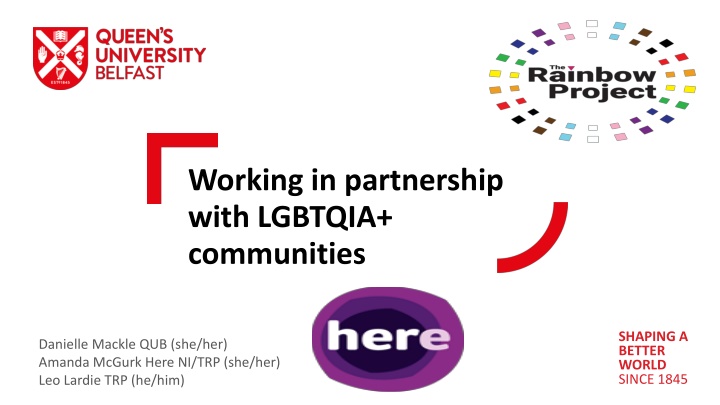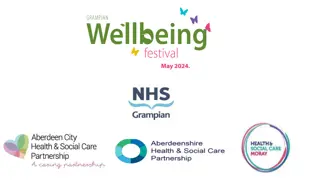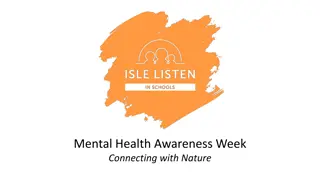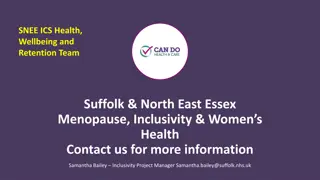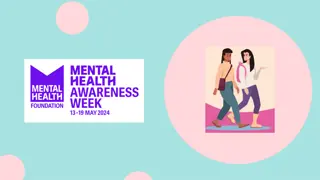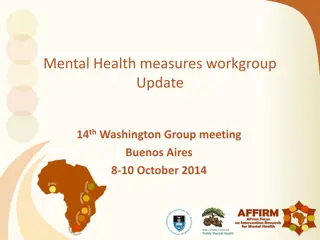Promoting Inclusivity and Mental Health Awareness in LGBTQIA+ Communities
Highlighting the challenges faced by LGBTQIA+ individuals, including discrimination and mental health issues, this content emphasizes the importance of creating inclusive environments. Statistics show the prevalence of discrimination and the need for holistic assessments in social work practices to support LGBTQIA+ individuals effectively.
Download Presentation

Please find below an Image/Link to download the presentation.
The content on the website is provided AS IS for your information and personal use only. It may not be sold, licensed, or shared on other websites without obtaining consent from the author.If you encounter any issues during the download, it is possible that the publisher has removed the file from their server.
You are allowed to download the files provided on this website for personal or commercial use, subject to the condition that they are used lawfully. All files are the property of their respective owners.
The content on the website is provided AS IS for your information and personal use only. It may not be sold, licensed, or shared on other websites without obtaining consent from the author.
E N D
Presentation Transcript
Working in partnership with LGBTQIA+ communities SHAPING A BETTER WORLD SINCE 1845 Danielle Mackle QUB (she/her) Amanda McGurk Here NI/TRP (she/her) Leo Lardie TRP (he/him)
Working in partnership with LGBTQIA+ communities setting the scene Introducing Amanda McGurk - Amanda works between HERe NI & The Rainbow Project as LGBT+ Mental Health Advocacy Officer. Welcome and Agenda Introducing Leo Lardie from The Rainbow Prohect Leo is the sexual health development officer for TRP Question and Answer session
From the National LGBT Survey (2018) with 108,000 respondents 68% participants stated they avoided holding hands in public with a same-sex partner for fear of a negative reaction from others. 56% of participants said they are not out at work. 25% of participants are not out to family members that they live with. 40% of participants had experienced a hate incident in the 12 months preceding the survey. 46% of participants have never discussed their LGBTQ+ identity with health and social care staff they have been involved with in the 12 months preceding the survey. 68% trans* participants stated that waiting lists for gender identity services are too long. Statistics
Mental health problems are more prevalent among LGBTQIA+ people due to the experience of ongoing discrimination. Older people are likely to have experienced longer exposure to discrimination and hostility, including through living through discriminatory laws. Young people are at greater risk of going into care or experiencing homelessness than their peers due to the negative reactions of families or communities. Almost half of LGBTQIA+ young people experienced bullying at school. These experiences result in greater levels of mental ill-health, substance misuse, and sexual health issues for LGBTQ+ young people than their peers. Evidence from research
Social work assessments often consider the support that family and extended family can give a person, LGBTQIA+ people are more likely than others to face challenges with their family. They may then seek support from a chosen family a group of people who are not biologically related but support and care for each other. Social workers may be uncertain about how to approach conversations surrounding sexuality and gender identity because they see them as private and not appropriate for discussion during assessment. But how can a person s needs be assessed holistically if they are LGBTQIA+ and the social worker does not know this? Practice considerations
Given LGBTQIA+ peoples experience of discrimination, harassment, and stigma, creating an inclusive environment is critical. Some suggestions include: Listening to how people describe their identity (pronouns, relationships) and using their language. Displaying LGBTQIA+ inclusive literature in the waiting areas. Using visible signs like rainbow Pride lanyards or pronouns on name tags. Having mandatory training for all staff about LGBTQIA+ identities and policy expectations. Creating an inclusive environment
Q&A Session with speakers Over to you!
